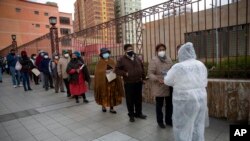The World Health Organization warned Monday that while global infection and death rates are declining, the COVID-19 pandemic is not over, contrary to the behavior in some nations where high numbers of people have been vaccinated.
At the agency's Monday briefing at its headquarters in Geneva, WHO Director-General Tedros Adhanom Ghebreyesus said that infections and deaths have declined globally for the second straight week. But he also said that while wealthier nations with the highest vaccination rates appear to have the mindset that the pandemic is over, the situation in several other countries is still very concerning.
"The COVID-19 pandemic is a long way from over, and it will not be over anywhere until it's over everywhere," Tedros said.
The WHO chief said new variants, fragile health systems, reduced implementation of public health measures, and supply shortages of treatments and vaccines are compounding the situation, especially in lower-income nations.
Tedros said the situation in those nations has compromised the global COVID-19 vaccine supply, and he echoed the statement issued earlier Monday by UNICEF, which warned that the WHO-administered vaccine cooperative COVAX was running out of vaccine.
The program distributes vaccines to the world's low-income nations and has relied on India's Serum Institute's exports of the AstraZeneca jab. But many of those vaccines have been used by the country as it battles a massive second wave of infections.
The WHO chief said COVAX is looking at a shortfall of 190 million doses of vaccine by the end of June. He said the program works and has delivered 65 million doses to 124 countries. But, he said, it is dependent on donor countries and manufacturers honoring their commitments to donate vaccines.
Tedros said that the makers of the AstraZeneca vaccine have been steadily increasing the speed and volume of their deliveries but that other manufacturers need to follow suit. Pfizer has committed to providing 40 million doses of vaccine with COVAX this year, but the majority of this would be in the second half of 2021.
"We need doses right now and call on them to bring forward deliveries as soon as possible," he said.
He also called on wealthy nations with a surplus of vaccines to share those vaccines with poorer nations who need them.
"We need to collectively set ambitious goals to at least vaccinate the adult population as quickly as possible. No one is safe until we're all safe," he said.




